Unit 9 Can you come to my party?Section A(3a-3c)课件
文档属性
| 名称 | Unit 9 Can you come to my party?Section A(3a-3c)课件 |  | |
| 格式 | zip | ||
| 文件大小 | 14.8MB | ||
| 资源类型 | 试卷 | ||
| 版本资源 | 人教新目标(Go for it)版 | ||
| 科目 | 英语 | ||
| 更新时间 | 2019-12-09 07:01:35 | ||
图片预览

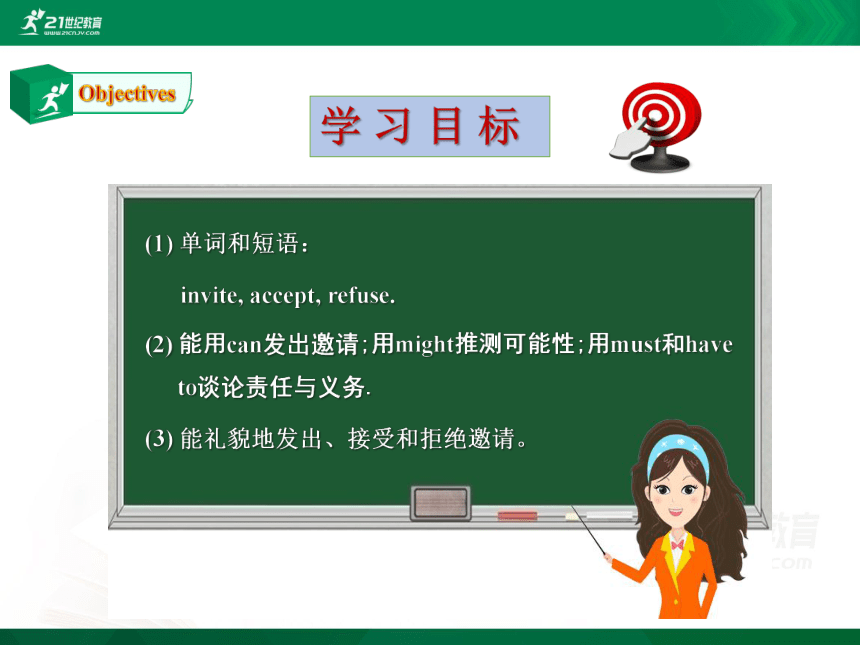
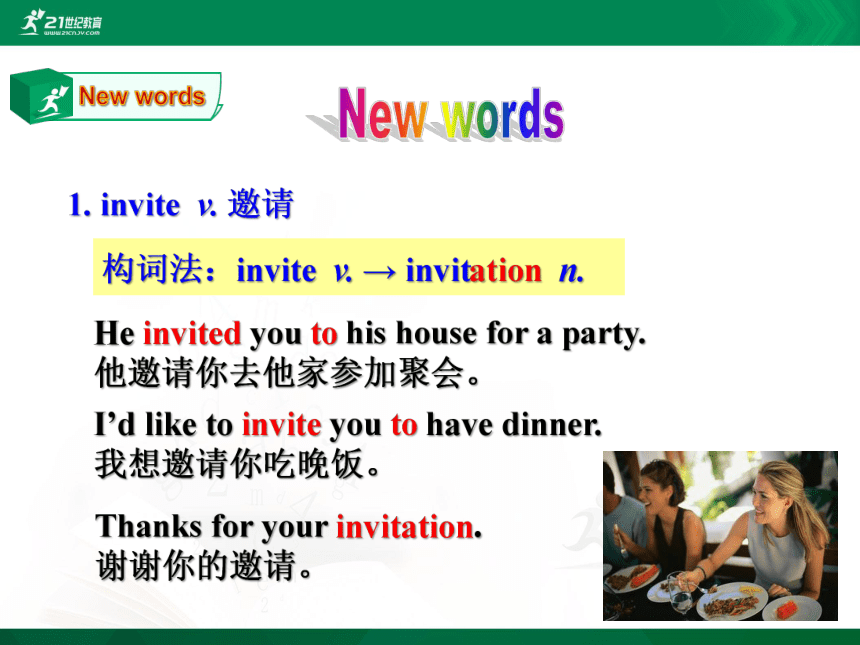
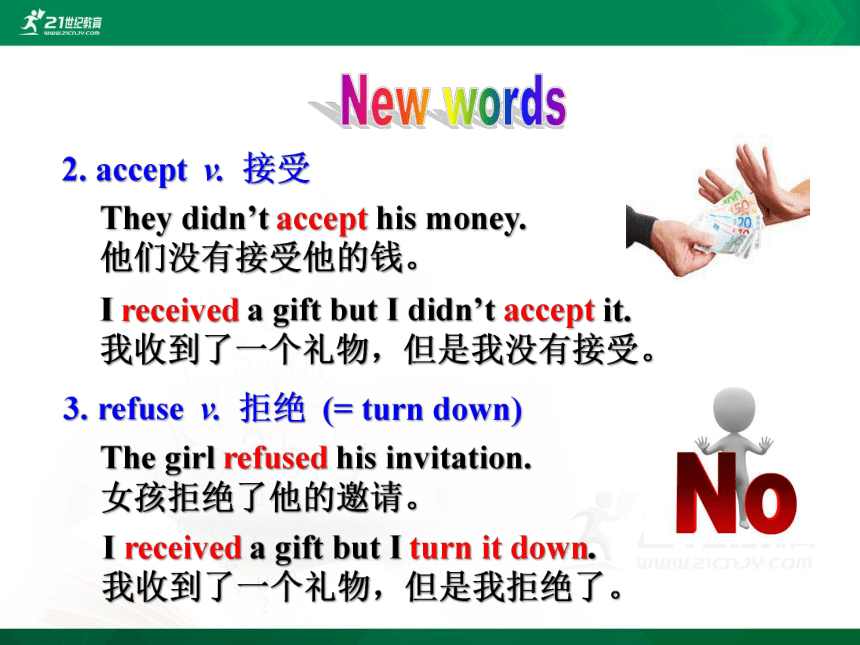
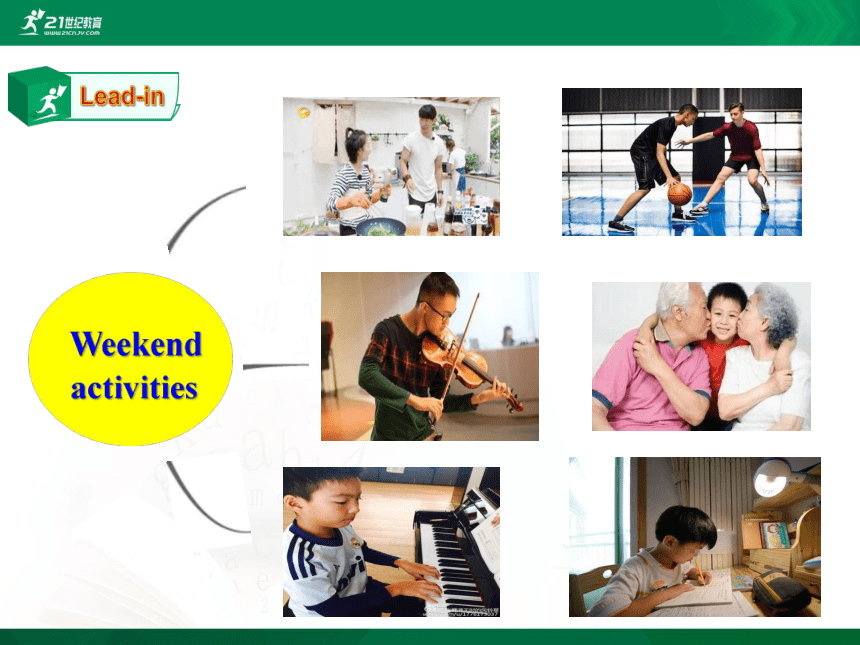

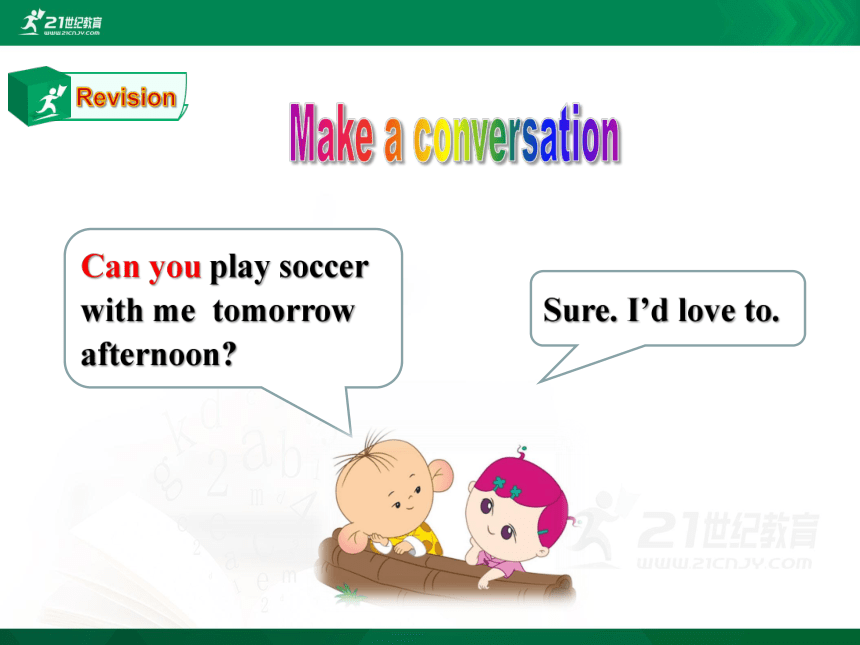
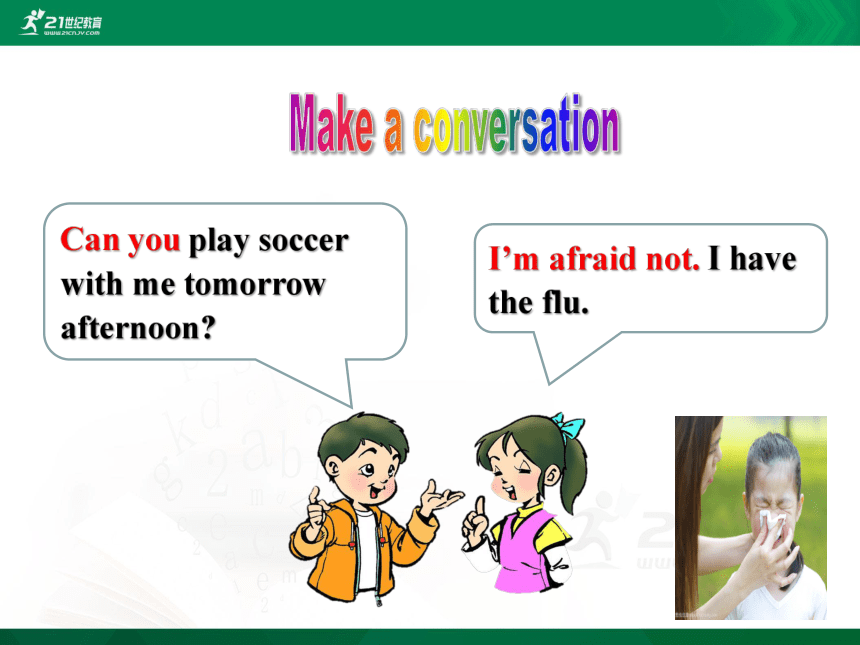
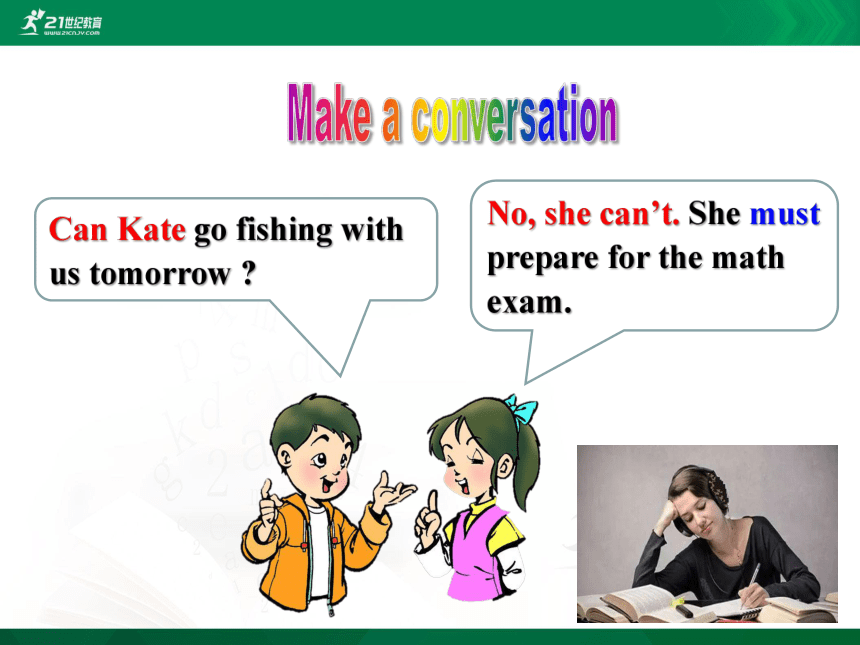
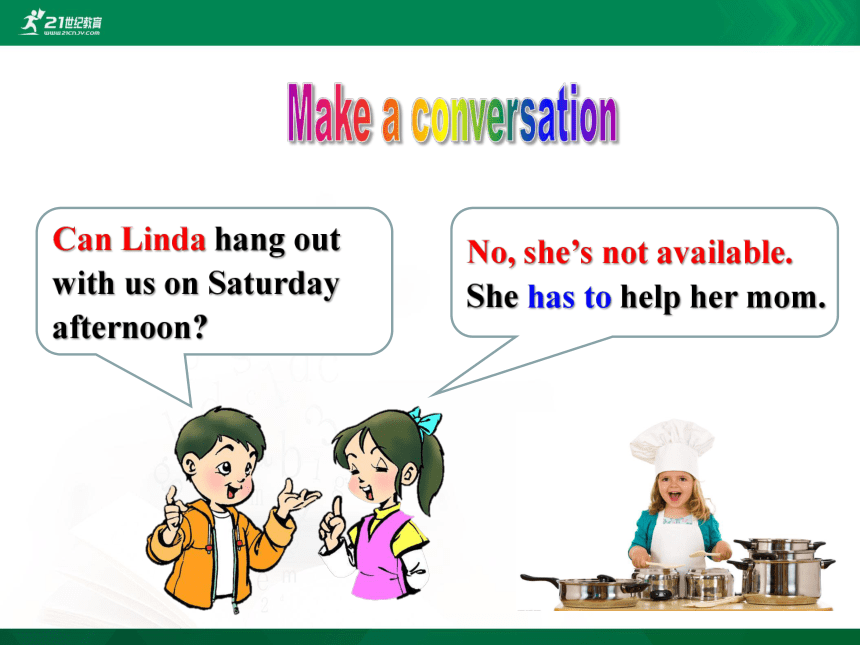
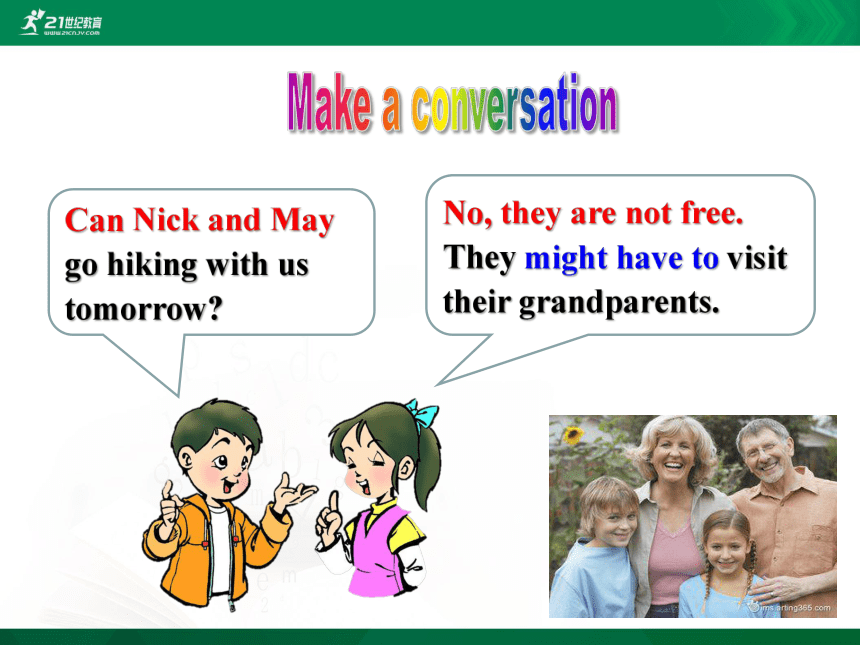
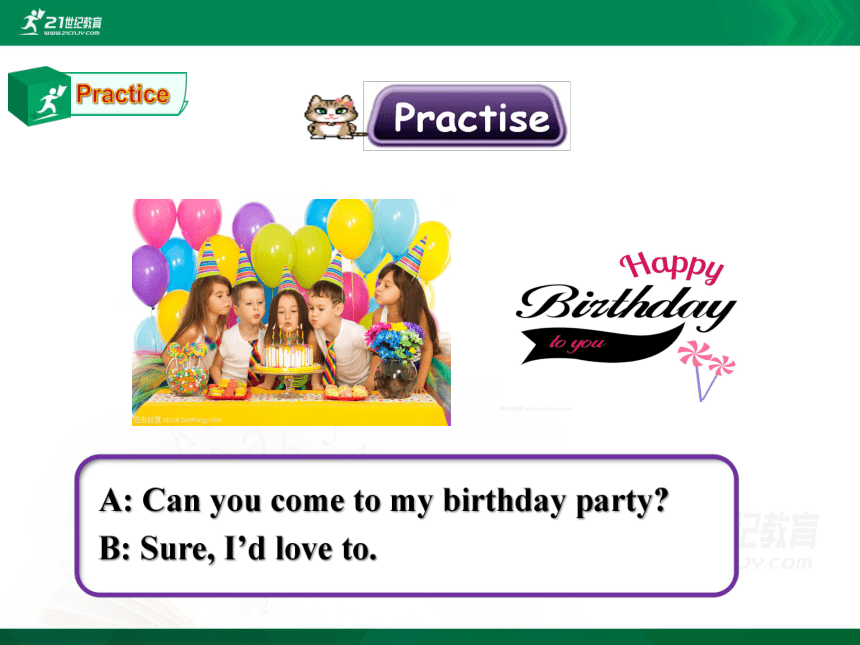
文档简介
(共61张PPT)
新课标 八年级上册
学 习 目 标
(1) 单词和短语:
invite, accept, refuse.
(2) 能用can发出邀请;用might推测可能性;用must和have to谈论责任与义务.
(3) 能礼貌地发出、接受和拒绝邀请。
1. invite v. 邀请
I’d like to invite you to have dinner.
我想邀请你吃晚饭。
构词法:invite v. → invitation n.
Thanks for your invitation.
谢谢你的邀请。
He invited you to his house for a party.
他邀请你去他家参加聚会。
The girl refused his invitation.
女孩拒绝了他的邀请。
3. refuse v. 拒绝 (= turn down)
2. accept v. 接受
They didn’t accept his money.
他们没有接受他的钱。
I received a gift but I didn’t accept it.
我收到了一个礼物,但是我没有接受。
I received a gift but I turn it down.
我收到了一个礼物,但是我拒绝了。
Weekend
activities
比一比,看谁反应快!
Sure. I’d love to.
Can you play soccer with me tomorrow afternoon?
Can you play soccer with me tomorrow afternoon?
I’m afraid not. I have the flu.
Can Kate go fishing with us tomorrow ?
No, she can’t. She must prepare for the math exam.
Can Linda hang out with us on Saturday afternoon?
No, she’s not available. She has to help her mom.
No, they are not free. They might have to visit their grandparents.
Can Nick and May go hiking with us tomorrow?
A: Can you come to my birthday party?
B: Sure, I’d love to.
A: Can you go to the concert?
B: I’m sorry. I can’t. I have to prepare for an
exam.
go to the concert
prepare for an exam
A: Can you go to the movies?
B: I’m sorry. I can’t. I have
to go to the doctor.
A: Can he go to the movies?
B: No, he can’t. He has to go
to the doctor.
go to movies
go to the doctor
A: Can you go to the zoo?
B: Sorry, I can’t. I have to
help my parents.
A: Can he go to the zoo?
B: No, he can’t. He has to
help his parents.
go to the zoo
help my parents
A: Can you play soccer with me?
B: Sorry, I can’t. I have to meet friends.
A: Can he play soccer?
B: No, he can’t. he has to meet friends.
play soccer
meet friends
A: Can you go to the baseball
game.?
B: Sorry, I can’t. I have to
play the piano.
A: Can he go to the baseball
game. ?
B: No, he can’t. He has to
play the piano.
play the piano
go to the baseball game
I can, you can, everybody can.
Sing, dance, jump and run.
He can, she can, everybody can.
Come, go, sit and stand.
You can, they can, everybody can.
Cook, clean, wash our pants.
We can, you can, everybody can.
Play, laugh and have a lot of fun.
Grammar Focus
朗读句子
Can you come to my party on Saturday? Sure, I’d love to.
Sorry, I must study for a math test.
Can you go to the movies tomorrow night? Sure. That sounds great.
I’m afraid not. I have the flu.
Can he go to the party? No, he can’t. He has to help his parents.
Can she go to the baseball game? No. she’s not available. She must go to the doctor.
Can they go to the movies? No, they’re not free. They might have to meet their friends.
1. 星期六你能来我的聚会吗?
____ you _____ to my party on Saturday?
2. 当然,我乐意去。Sure, ____ ____ ___.
3. 对不起,我必须为数学考试而学习。
Sorry, I _____ ______ ____ a math test.
4. 明天晚上你能去看电影吗?
____ you ___ to the movies _________ night?
5. 当然可以,听起来很棒。
_____, that _______ _____.
I’d love to
Can come
must study for
Can go
tomorrow
Sure sounds great
6. 恐怕不行,我得了流感。
I’m ______ not. I have the ____.
7. 他能去聚会吗?
____ he ___ to the party?
8. 不能。他得帮助他的父母。
No, he _____. He ___ to help his parents.
9. 她能参加棒球比赛吗?
____ she go to the baseball ______?
afraid flu
Can game
Can go
can’t has
10. 不, 她没有空。她必须去看医生。
No, she’s ___ _________. She _____ ___ to the ______.
11. 他们能去看电影吗?
____ they ____ to the _______?
12. 不,他们没有空。他们可能必须去见朋友。
No, they’re not ____. They _____ ______ ___
meet their _______.
not available
doctor
friends
Can go movies
free might have
must go
to
归纳情态动词can/must/might用法
A: Can you come to my party on Sunday?
B: Sorry, I must go to the doctor.
C: Can he/she/they go to…?
D: Yes. / No, …can’t. he/she/they might…
① 情态动词不能独立作谓语,只能和动词原形一起构
成谓语,表示说话人的语气和情态,无_____和____
的变化,后面跟________.变疑问句时,把________
提到主语前;变否定句时,在_________________.
人称
数
动词原形
情态动词后加not
情态动词
A: Can you come to my party on Sunday?
B: Sure, I’d love to
C: Sorry, I must study for a test.
D: Sorry, I have to help my parents.
② ____ 在本单元中表示 ___________
接受邀请用 ________________。
拒绝邀请用 _______________ 。
_____, ________ 陈述责任和义务。
请求, 邀请。
Sure,I’d love to
Sorry , + 原因
can
must
have to
归纳情态动词 can/must/might 用法
(1) 表示邀请的句型: (你能来参加我的聚会吗?)
小 结
① Can you come to my party?
② Could you come to my party?
③ Would you like to come to my party?
(2) 常见表示接受邀请的回答:
① Sure, I’d love to. ② Yes, I’d love to.
③ Sure. That sounds great.
(3) 常见表示拒绝邀请的回答:
① Sorry. I’m not available. I must....
② I’m sorry. I’m not free. I might have to ....
③ I’d love to, but I’m afraid I can’t. I have to...
向别人发出请求、邀请或征求意见其他表达方法:
Would you like to do…?“你想要/愿意……”?
Would you please do…?“请你……好吗?”
Shall we do…?“我们……好吗?”
Let’s do… “让我们……吧。”
Why not do…?=Why don’t you do…? 为什么不…?
How/What about doing…? “……怎么样?”
情态动词 can 有一定的词义,但不能独立存在,它必须与动词原形一起构成谓语。情态动词 can 没有人称和数的变化。其具体用法如下:
表示“能、会”指脑力或体力方面的“能力”。如:
? I can speak Japanese.
我会讲日语。
? Frank can swim but I can’t.
佛兰克会游泳, 但我不会。
情态动词 can 的基本用法
2. 表示“可能”,常用于否定句或疑问句中,指某种可能性。例如:
? My cousin can’t be in this city. He is in Korea now.
我堂兄不可能在这个城市里。他在韩国呢。
? Can he come to our club today, please?
请问他今天能来我们俱乐部吗?
3. 表示“可以”,常用于口语中,指许可或请求做某事
? Can I ask you a question? 我可以问你一个问题吗?
? You can bring something to eat. 你可以带些吃的。
4. can表示请求,用于发出邀请,后跟动词原形。当同意接受
对方的邀请时,常用Sure, I’d love to. / Certainly. /Of course.
等来回答;若不接受,常用Sorry等来有礼貌地拒绝,一般情
况下需要说明不能接受邀请的原因以表示歉意。
? —Can you come to my birthday party tomorrow?
明天你来参加我的生日聚会,好吗?
—Sorry, I can’t. I am going to visit my grandpa.
很抱歉,我来不了,我要去看我爷爷。
Can 表示邀请:
Can you come to my party?
can的用法
情态动词can没有人称和数的变化,过去式为could;其后接动词原形;
否定:can后加not;
疑问:can放主语前。
can表示能力, “能;会”
She can swim, but I can’t.
can表示允许, “能;可以”
You can use my computer.
can表示可能, “能够;会”
I can get there in ten minutes
(1)都可表示“许可”, may用于较正式场合,can比较口语化。
You may/can smoke here.
?You may not take out of the library more than two books at
a time.
?The policeman says you can’t park here.
(2) May/Can I/we…? 表示征询对方许可;Can you…? 表请求。
① - May I use your phone?
- Yes, you may./Yes, please. /
- No, you may not./No, you mustn’t./No, you’d better not. /
I’m afraid not.//I’m sorry. I’d rather you didn’t.
② - Can I go out and play, Mum?
- Yes/Certainly, you can. /No, you can’t.
can与may的区别
比一比
③ - Can you help me with this bag?
- With pleasure./Sorry, I can’t.
(3) 都可表示“可能性”
Mr. Reed looks pale. He may be ill.
Mr. Read is in poor health.He can be ill at any time.
This news may be true.(=might/could)
Wang Wei can be really stubborn.
(4) can 还可表示“能力”、“能够”
—You can swim, can’t you? —No, I can’t.
I can’t promise anything, but I’ll do what I can.
Tickets can be bought from the Tourist Information Center.
③ _____多表主观意志._______强调客观需要,意为
_______;在一般现在时中,当主语为第三人称单
数时,变成______.在一般过去时中,变成______.
has to
have to
不得不
must
He doesn’t like the book . He must buy another one.
- He lost the book. He has to buy one.
had to
归纳情态动词can/must/might用法
have to的意思是“必须、不得不”, 往往强调由于客观原因
而必须做某事。后接动词原形;有人称、数和时态的变化,
其第三人称单数形式为has to, 其疑问形式和否定形式要借
助于助动词do或does来完成。例如:
?We have to look after our sister at home.
?Does he have to get up early tomorrow morning?
?I don’t have to stay at home today.
have to 的用法
1. have (has) to + 动词原形
? have (has) to 后面要用动词原形。当主语为第三人称单数时用 has to,当句子是过去时用 had to。
? We have to go home now.
我们不得不现在就回家。
? He has to work on Sunday.
他不得不在周日工作。
? I had to do much housework last Sunday.?
上周日我不得不做很多作业。
2. have to 的否定句句型:
主语 +don’t/didn’t/doesn’t won’t +have to + 动词原形
? You don’t have to walk so fast.
你不必走那么快。
? He will not have to buy a new coat next year.
明年他没必要买新外衣了。
3. have to 的疑问句句型:
Do/Does/Did/Will + 主语 + have to + 动词原形
Did he have to ask the question?
他非要问那个问题吗?
Yes, he did. 是的。 No, he didn’t (have to). 不。
have to 与 must
二者都有“必须”之意,但 have to 表示“客观上的需要”,有人称和时态的变化,否定形式为 don’t / doesn’t / didn’t have to (没必要);must 表示“主观上的要求”,无人称和时态的变化,否定回答一般用 needn’t 或 don't have to (不必)。mustn’t 表示“禁止”。
We have to wear warm clothes in winter.
冬天我们不得不穿上暖和的衣服。 (客观需要)
I must finish my homework first before I watch TV.
看电视前我必须先完成作业。(主观要求)
比一比
You don't have to tell him about it.
你没有必要把此事告诉他。
You mustn't tell him about it.
你一定不要把这件事告诉他。
- Must I be home before eight o’clock?
8点之前我必须回家吗?
- Yes, you must.
- No, you needn‘t. / No, you don’t have to.
是的,必须回家。/不,不必。
④在答复别人时,如果自己不确定,用______表示推
测和可能.might 表示推测时,不表示时态。只是可
能性比may小。____________意为____________.
A: Can they go to the movies ?
B: No, they’re not free.
They might have to meet their friends.
A: Are you free to come to my party?
B: I’m not sure. I might practice the violin.
might
可能不得不
might have to
归纳情态动词can/must/might用法
A: Hi, Peter. _____ you come to my party ____ the
weekend?
B: Sure, ____ love to.
A: How about , Jenny?
C: I’m afraid I . I to look after my
little cousin.
A: _____ you come, Jeff?
D: I be able to, but I’m not sure. let
you know tomorrow.
Can
on
I’d
you
can’t
have
Can
might
I’ll
Fill in the blanks in the conversation.
1. Invitation: Can you come to my party on Saturday ?
Reply: ________________________________________
2. Invitation: “Let’s go to the movies tomorrow night.”
Reply: _________________________________________
3. Invitation: “Let’s go to the concert on the weekend.”
Reply: _________________________________________
4. Invitation: Do you want to go shopping with me next week?
Reply:__________________________________________
_______________________
Sorry, I can’t. I have to prepare for math test.
You get these invitations but can’t go. Write a refusal and a reason.
Sorry, I can’t. I must visit my grandparents.
Sorry, I’m afraid not. I will go to the concert .
Sorry, I’m afraid I can’t. I might go to the
summer camp.
Complete the answers
with might and one of
the phrases in the box.
watch TV
on the weekend
my cousin
visit grandparents
practice the violin
1. A: What are you going to do on Saturday?
B: I’m not sure. I might _________________
2. A: What are you planning to do after school?
B: I don’t know. ____________________
3. A: When will you finish the science homework?
B: ____________________________________
4. A: Who are you going to the movies with?
B: ____________________________________
5. A: Are you free to come to my place on Saturday?
B: ____________________________________
practice the violin.
I might watch TV.
I don’t know. Might on the weekend.
I’m not sure. Might with my cousin.
I’m not sure. I might have to visit grandparents.
might+动词原形
Complete the sentences below. Use the words in brackets to help you.
1. Inviting: _________________________________ (can/play tennis)
Accepting: _____________________________________
2. Inviting: ________________________________________
(would like to/go to the movies)
Refusing: _______________________________________
Reason: ____________________________________(might have to)
3. Inviting: _____________________________________
(can/ hang out with us tonight)
Refusing: _____________________________
Reason: ______________________ (must)
4. Inviting: _________________________________________
(would like to/come to my birthday party)
Accepting: ___________________________
Can you play tennis on Saturday?
Sure. That sounds great.
Would you like to go to the movies on Friday?
Sorry, I can’t.
I might have to go out with my parents.
Can you hang out with us tonight?
Sorry, I’m not free.
I must study for a test.
Would you like to come to my birthday party?
Sure. I’d love to.
考向一【重点】
invite sb.to sp. 邀请某人去某地
eg: I'm going to invite my friends to my house this
Sunday.
知识点
1
invite v.邀请
考向二
invite sb.to do sth.邀请某人做某事
eg: Kim invites me to spend my summer vacation with her in Tibet.
拓展
invite的相关词及搭配
典例
Jane was shy. She would not invite her classmates
____ speaking English.
A. practice B. practices
C. practicing D. to practice
D
考向
[辨析] accept与receive
知识点
2
accept /?k'sept/ v.接受
accept 意为“接受”,主观上愿意接受。
receive 意为“收到”,指客观上收到或
拿到,但主观上不一定会接受。
I received his gift yesterday,but I didn’t accept it.
昨天我收到了他的礼物,但我没有接受它。
理
解
拓展
I didn’t mean to trouble Curry yesterday. It was pouring with rain so I _______his offer of a lift.
A. refused B. received C. allowed D. accepted
D
考向一
refuse sb./sth. 拒绝某人/某物
eg:I don't think he will refuse me.
She refused their invitation.
知识点
3
refuse /r?'fju?z/ v. 拒绝
refuse sb. sth. 拒绝某人某事
eg:He refused me permission.
考向二
refuse to do sth. 拒绝做某事
eg:He refused to go with us.
考向三
Write down everything you have to do next week . Choose a day and time to have a party. Then invite classmates to your party.
have a piano lesson
do my homework
visit my aunt
play basketball
have a party
help my parents
prepare for a test
MON.
TUE.
WED.
THUR.
FRI.
SAT.
SUN.
A: Can you … ?
B: When is it?
A: Next week, on Saturday night.
B: Sorry, I can’t./I’m not available. I must…
A: Too bad. How about you…?
C: Sure! That sounds great./I’d love to.
A: What about you…?
D: I’m sorry, too. I have to...
A: Too bad! Maybe another time.
Make your invitation
Dear Ms Wang,
I am going to have a party in my home at 9 this Saturday. Can you come? We can watch movies and have fun. Please let me know by Friday.
Ms Song
写邀请函
Hi Ms Song,
Thanks for inviting me to your party.
I’m sorry. I have to do housework.
Maybe next time.
Ms Wang
Reply your invitation
答复邀请函
I’m going to have a party on Saturday,I
invite my friends to _________, I’m glad ____
is coming . ____ would like to come, but ____
can’t. He has to ___________ . ____ can’t go,
either. she must _______________.
my party
Tim
he
meet friends
Alice
go to the doctor
John
一、用括号内单词的适当形式填空
1. Tony invites us ______ (play) soccer with him tomorrow.
2. He will not refuse ______ (help) you. Don’t worry.
3. Who is making the ________ (invite), do you know?
4. Li Chen asked Fan Bingbing to marry him and she
________ (accept).
5. I’d like you to come to the ________ (open) of our new library on Monday.
to play
to help
invitation
accepted
opening
Exercise
6. - Can you ____ to my house to watch Nirvana in Fire II?
- Yes, I’d love to.
A. come B. comes C. coming D. to come
7. - Can you come to my party tomorrow afternoon?
- Sorry, I can’t. I ______ study for an exam.
A. can B. may C. must
8. - Mum, I play football this afternoon?
- Sure, but you ______finish your homework first.
A. may; could B. can; must
C. can; mustn’t D. may; can’t
A
二、单项选择
来自《点拨》
C
B
Exercise
9. - Would you like to play football after school?
- ______. I have a lot of homework to do.
A. I’m afraid not B. Enjoy yourself
C. Take your time D. It takes no time
10. - Would you like to come to dinner tomorrow evening?
- ________
A. Yes, it’s true. B. You really do.
C. It’s upstairs. D. Yes, I’d love to.
A
D
Exercise
11. I have ____ homework to do.
A. too many B. too much
C. much too D. a few
12. Joe ____ go to the doctor. His leg is broken.
A. have to B. can C. has to D. may
13. I have to ____ for the math test.
A. study B. studying C. learning D. studied
14. - What are you going to do this weekend, Laura?
- I ___ go to see the movie ,but I'm not sure.
A. might B. can C. must D. will
B
C
A
Exercise
A
从下面方框中选出最佳选项,使对话完整。其中有两项多余。
Alice: Hey, Bob.______
Bob: I’m sorry, I can’t. I have to help my parents.
Alice: _____ How about you, Ling Ling? Can you come to my party?
Ling Ling: _____
Alice: On Saturday afternoon.
Ling Ling: Oh, no, I can’t. ____
Alice: Too bad._______
That’s too bad.
Can you come to my party?
Are you going shopping with me?
Maybe another time.
I have to study for a test.
When is it?
I’d love to.
B
A
F
E
D
Exercise
Homework
1. Make your next birthday invitation and
invite your friends in English.
2. 你的朋友邀请你去看电影,请根据在3c中
所填写的信息编写一个与你朋友的对话。
谢谢
21世纪教育网(www.21cnjy.com) 中小学教育资源网站
有大把高质量资料?一线教师?一线教研员?
欢迎加入21世纪教育网教师合作团队!!月薪过万不是梦!!
详情请看:
https://www.21cnjy.com/help/help_extract.php
新课标 八年级上册
学 习 目 标
(1) 单词和短语:
invite, accept, refuse.
(2) 能用can发出邀请;用might推测可能性;用must和have to谈论责任与义务.
(3) 能礼貌地发出、接受和拒绝邀请。
1. invite v. 邀请
I’d like to invite you to have dinner.
我想邀请你吃晚饭。
构词法:invite v. → invitation n.
Thanks for your invitation.
谢谢你的邀请。
He invited you to his house for a party.
他邀请你去他家参加聚会。
The girl refused his invitation.
女孩拒绝了他的邀请。
3. refuse v. 拒绝 (= turn down)
2. accept v. 接受
They didn’t accept his money.
他们没有接受他的钱。
I received a gift but I didn’t accept it.
我收到了一个礼物,但是我没有接受。
I received a gift but I turn it down.
我收到了一个礼物,但是我拒绝了。
Weekend
activities
比一比,看谁反应快!
Sure. I’d love to.
Can you play soccer with me tomorrow afternoon?
Can you play soccer with me tomorrow afternoon?
I’m afraid not. I have the flu.
Can Kate go fishing with us tomorrow ?
No, she can’t. She must prepare for the math exam.
Can Linda hang out with us on Saturday afternoon?
No, she’s not available. She has to help her mom.
No, they are not free. They might have to visit their grandparents.
Can Nick and May go hiking with us tomorrow?
A: Can you come to my birthday party?
B: Sure, I’d love to.
A: Can you go to the concert?
B: I’m sorry. I can’t. I have to prepare for an
exam.
go to the concert
prepare for an exam
A: Can you go to the movies?
B: I’m sorry. I can’t. I have
to go to the doctor.
A: Can he go to the movies?
B: No, he can’t. He has to go
to the doctor.
go to movies
go to the doctor
A: Can you go to the zoo?
B: Sorry, I can’t. I have to
help my parents.
A: Can he go to the zoo?
B: No, he can’t. He has to
help his parents.
go to the zoo
help my parents
A: Can you play soccer with me?
B: Sorry, I can’t. I have to meet friends.
A: Can he play soccer?
B: No, he can’t. he has to meet friends.
play soccer
meet friends
A: Can you go to the baseball
game.?
B: Sorry, I can’t. I have to
play the piano.
A: Can he go to the baseball
game. ?
B: No, he can’t. He has to
play the piano.
play the piano
go to the baseball game
I can, you can, everybody can.
Sing, dance, jump and run.
He can, she can, everybody can.
Come, go, sit and stand.
You can, they can, everybody can.
Cook, clean, wash our pants.
We can, you can, everybody can.
Play, laugh and have a lot of fun.
Grammar Focus
朗读句子
Can you come to my party on Saturday? Sure, I’d love to.
Sorry, I must study for a math test.
Can you go to the movies tomorrow night? Sure. That sounds great.
I’m afraid not. I have the flu.
Can he go to the party? No, he can’t. He has to help his parents.
Can she go to the baseball game? No. she’s not available. She must go to the doctor.
Can they go to the movies? No, they’re not free. They might have to meet their friends.
1. 星期六你能来我的聚会吗?
____ you _____ to my party on Saturday?
2. 当然,我乐意去。Sure, ____ ____ ___.
3. 对不起,我必须为数学考试而学习。
Sorry, I _____ ______ ____ a math test.
4. 明天晚上你能去看电影吗?
____ you ___ to the movies _________ night?
5. 当然可以,听起来很棒。
_____, that _______ _____.
I’d love to
Can come
must study for
Can go
tomorrow
Sure sounds great
6. 恐怕不行,我得了流感。
I’m ______ not. I have the ____.
7. 他能去聚会吗?
____ he ___ to the party?
8. 不能。他得帮助他的父母。
No, he _____. He ___ to help his parents.
9. 她能参加棒球比赛吗?
____ she go to the baseball ______?
afraid flu
Can game
Can go
can’t has
10. 不, 她没有空。她必须去看医生。
No, she’s ___ _________. She _____ ___ to the ______.
11. 他们能去看电影吗?
____ they ____ to the _______?
12. 不,他们没有空。他们可能必须去见朋友。
No, they’re not ____. They _____ ______ ___
meet their _______.
not available
doctor
friends
Can go movies
free might have
must go
to
归纳情态动词can/must/might用法
A: Can you come to my party on Sunday?
B: Sorry, I must go to the doctor.
C: Can he/she/they go to…?
D: Yes. / No, …can’t. he/she/they might…
① 情态动词不能独立作谓语,只能和动词原形一起构
成谓语,表示说话人的语气和情态,无_____和____
的变化,后面跟________.变疑问句时,把________
提到主语前;变否定句时,在_________________.
人称
数
动词原形
情态动词后加not
情态动词
A: Can you come to my party on Sunday?
B: Sure, I’d love to
C: Sorry, I must study for a test.
D: Sorry, I have to help my parents.
② ____ 在本单元中表示 ___________
接受邀请用 ________________。
拒绝邀请用 _______________ 。
_____, ________ 陈述责任和义务。
请求, 邀请。
Sure,I’d love to
Sorry , + 原因
can
must
have to
归纳情态动词 can/must/might 用法
(1) 表示邀请的句型: (你能来参加我的聚会吗?)
小 结
① Can you come to my party?
② Could you come to my party?
③ Would you like to come to my party?
(2) 常见表示接受邀请的回答:
① Sure, I’d love to. ② Yes, I’d love to.
③ Sure. That sounds great.
(3) 常见表示拒绝邀请的回答:
① Sorry. I’m not available. I must....
② I’m sorry. I’m not free. I might have to ....
③ I’d love to, but I’m afraid I can’t. I have to...
向别人发出请求、邀请或征求意见其他表达方法:
Would you like to do…?“你想要/愿意……”?
Would you please do…?“请你……好吗?”
Shall we do…?“我们……好吗?”
Let’s do… “让我们……吧。”
Why not do…?=Why don’t you do…? 为什么不…?
How/What about doing…? “……怎么样?”
情态动词 can 有一定的词义,但不能独立存在,它必须与动词原形一起构成谓语。情态动词 can 没有人称和数的变化。其具体用法如下:
表示“能、会”指脑力或体力方面的“能力”。如:
? I can speak Japanese.
我会讲日语。
? Frank can swim but I can’t.
佛兰克会游泳, 但我不会。
情态动词 can 的基本用法
2. 表示“可能”,常用于否定句或疑问句中,指某种可能性。例如:
? My cousin can’t be in this city. He is in Korea now.
我堂兄不可能在这个城市里。他在韩国呢。
? Can he come to our club today, please?
请问他今天能来我们俱乐部吗?
3. 表示“可以”,常用于口语中,指许可或请求做某事
? Can I ask you a question? 我可以问你一个问题吗?
? You can bring something to eat. 你可以带些吃的。
4. can表示请求,用于发出邀请,后跟动词原形。当同意接受
对方的邀请时,常用Sure, I’d love to. / Certainly. /Of course.
等来回答;若不接受,常用Sorry等来有礼貌地拒绝,一般情
况下需要说明不能接受邀请的原因以表示歉意。
? —Can you come to my birthday party tomorrow?
明天你来参加我的生日聚会,好吗?
—Sorry, I can’t. I am going to visit my grandpa.
很抱歉,我来不了,我要去看我爷爷。
Can 表示邀请:
Can you come to my party?
can的用法
情态动词can没有人称和数的变化,过去式为could;其后接动词原形;
否定:can后加not;
疑问:can放主语前。
can表示能力, “能;会”
She can swim, but I can’t.
can表示允许, “能;可以”
You can use my computer.
can表示可能, “能够;会”
I can get there in ten minutes
(1)都可表示“许可”, may用于较正式场合,can比较口语化。
You may/can smoke here.
?You may not take out of the library more than two books at
a time.
?The policeman says you can’t park here.
(2) May/Can I/we…? 表示征询对方许可;Can you…? 表请求。
① - May I use your phone?
- Yes, you may./Yes, please. /
- No, you may not./No, you mustn’t./No, you’d better not. /
I’m afraid not.//I’m sorry. I’d rather you didn’t.
② - Can I go out and play, Mum?
- Yes/Certainly, you can. /No, you can’t.
can与may的区别
比一比
③ - Can you help me with this bag?
- With pleasure./Sorry, I can’t.
(3) 都可表示“可能性”
Mr. Reed looks pale. He may be ill.
Mr. Read is in poor health.He can be ill at any time.
This news may be true.(=might/could)
Wang Wei can be really stubborn.
(4) can 还可表示“能力”、“能够”
—You can swim, can’t you? —No, I can’t.
I can’t promise anything, but I’ll do what I can.
Tickets can be bought from the Tourist Information Center.
③ _____多表主观意志._______强调客观需要,意为
_______;在一般现在时中,当主语为第三人称单
数时,变成______.在一般过去时中,变成______.
has to
have to
不得不
must
He doesn’t like the book . He must buy another one.
- He lost the book. He has to buy one.
had to
归纳情态动词can/must/might用法
have to的意思是“必须、不得不”, 往往强调由于客观原因
而必须做某事。后接动词原形;有人称、数和时态的变化,
其第三人称单数形式为has to, 其疑问形式和否定形式要借
助于助动词do或does来完成。例如:
?We have to look after our sister at home.
?Does he have to get up early tomorrow morning?
?I don’t have to stay at home today.
have to 的用法
1. have (has) to + 动词原形
? have (has) to 后面要用动词原形。当主语为第三人称单数时用 has to,当句子是过去时用 had to。
? We have to go home now.
我们不得不现在就回家。
? He has to work on Sunday.
他不得不在周日工作。
? I had to do much housework last Sunday.?
上周日我不得不做很多作业。
2. have to 的否定句句型:
主语 +don’t/didn’t/doesn’t won’t +have to + 动词原形
? You don’t have to walk so fast.
你不必走那么快。
? He will not have to buy a new coat next year.
明年他没必要买新外衣了。
3. have to 的疑问句句型:
Do/Does/Did/Will + 主语 + have to + 动词原形
Did he have to ask the question?
他非要问那个问题吗?
Yes, he did. 是的。 No, he didn’t (have to). 不。
have to 与 must
二者都有“必须”之意,但 have to 表示“客观上的需要”,有人称和时态的变化,否定形式为 don’t / doesn’t / didn’t have to (没必要);must 表示“主观上的要求”,无人称和时态的变化,否定回答一般用 needn’t 或 don't have to (不必)。mustn’t 表示“禁止”。
We have to wear warm clothes in winter.
冬天我们不得不穿上暖和的衣服。 (客观需要)
I must finish my homework first before I watch TV.
看电视前我必须先完成作业。(主观要求)
比一比
You don't have to tell him about it.
你没有必要把此事告诉他。
You mustn't tell him about it.
你一定不要把这件事告诉他。
- Must I be home before eight o’clock?
8点之前我必须回家吗?
- Yes, you must.
- No, you needn‘t. / No, you don’t have to.
是的,必须回家。/不,不必。
④在答复别人时,如果自己不确定,用______表示推
测和可能.might 表示推测时,不表示时态。只是可
能性比may小。____________意为____________.
A: Can they go to the movies ?
B: No, they’re not free.
They might have to meet their friends.
A: Are you free to come to my party?
B: I’m not sure. I might practice the violin.
might
可能不得不
might have to
归纳情态动词can/must/might用法
A: Hi, Peter. _____ you come to my party ____ the
weekend?
B: Sure, ____ love to.
A: How about , Jenny?
C: I’m afraid I . I to look after my
little cousin.
A: _____ you come, Jeff?
D: I be able to, but I’m not sure. let
you know tomorrow.
Can
on
I’d
you
can’t
have
Can
might
I’ll
Fill in the blanks in the conversation.
1. Invitation: Can you come to my party on Saturday ?
Reply: ________________________________________
2. Invitation: “Let’s go to the movies tomorrow night.”
Reply: _________________________________________
3. Invitation: “Let’s go to the concert on the weekend.”
Reply: _________________________________________
4. Invitation: Do you want to go shopping with me next week?
Reply:__________________________________________
_______________________
Sorry, I can’t. I have to prepare for math test.
You get these invitations but can’t go. Write a refusal and a reason.
Sorry, I can’t. I must visit my grandparents.
Sorry, I’m afraid not. I will go to the concert .
Sorry, I’m afraid I can’t. I might go to the
summer camp.
Complete the answers
with might and one of
the phrases in the box.
watch TV
on the weekend
my cousin
visit grandparents
practice the violin
1. A: What are you going to do on Saturday?
B: I’m not sure. I might _________________
2. A: What are you planning to do after school?
B: I don’t know. ____________________
3. A: When will you finish the science homework?
B: ____________________________________
4. A: Who are you going to the movies with?
B: ____________________________________
5. A: Are you free to come to my place on Saturday?
B: ____________________________________
practice the violin.
I might watch TV.
I don’t know. Might on the weekend.
I’m not sure. Might with my cousin.
I’m not sure. I might have to visit grandparents.
might+动词原形
Complete the sentences below. Use the words in brackets to help you.
1. Inviting: _________________________________ (can/play tennis)
Accepting: _____________________________________
2. Inviting: ________________________________________
(would like to/go to the movies)
Refusing: _______________________________________
Reason: ____________________________________(might have to)
3. Inviting: _____________________________________
(can/ hang out with us tonight)
Refusing: _____________________________
Reason: ______________________ (must)
4. Inviting: _________________________________________
(would like to/come to my birthday party)
Accepting: ___________________________
Can you play tennis on Saturday?
Sure. That sounds great.
Would you like to go to the movies on Friday?
Sorry, I can’t.
I might have to go out with my parents.
Can you hang out with us tonight?
Sorry, I’m not free.
I must study for a test.
Would you like to come to my birthday party?
Sure. I’d love to.
考向一【重点】
invite sb.to sp. 邀请某人去某地
eg: I'm going to invite my friends to my house this
Sunday.
知识点
1
invite v.邀请
考向二
invite sb.to do sth.邀请某人做某事
eg: Kim invites me to spend my summer vacation with her in Tibet.
拓展
invite的相关词及搭配
典例
Jane was shy. She would not invite her classmates
____ speaking English.
A. practice B. practices
C. practicing D. to practice
D
考向
[辨析] accept与receive
知识点
2
accept /?k'sept/ v.接受
accept 意为“接受”,主观上愿意接受。
receive 意为“收到”,指客观上收到或
拿到,但主观上不一定会接受。
I received his gift yesterday,but I didn’t accept it.
昨天我收到了他的礼物,但我没有接受它。
理
解
拓展
I didn’t mean to trouble Curry yesterday. It was pouring with rain so I _______his offer of a lift.
A. refused B. received C. allowed D. accepted
D
考向一
refuse sb./sth. 拒绝某人/某物
eg:I don't think he will refuse me.
She refused their invitation.
知识点
3
refuse /r?'fju?z/ v. 拒绝
refuse sb. sth. 拒绝某人某事
eg:He refused me permission.
考向二
refuse to do sth. 拒绝做某事
eg:He refused to go with us.
考向三
Write down everything you have to do next week . Choose a day and time to have a party. Then invite classmates to your party.
have a piano lesson
do my homework
visit my aunt
play basketball
have a party
help my parents
prepare for a test
MON.
TUE.
WED.
THUR.
FRI.
SAT.
SUN.
A: Can you … ?
B: When is it?
A: Next week, on Saturday night.
B: Sorry, I can’t./I’m not available. I must…
A: Too bad. How about you…?
C: Sure! That sounds great./I’d love to.
A: What about you…?
D: I’m sorry, too. I have to...
A: Too bad! Maybe another time.
Make your invitation
Dear Ms Wang,
I am going to have a party in my home at 9 this Saturday. Can you come? We can watch movies and have fun. Please let me know by Friday.
Ms Song
写邀请函
Hi Ms Song,
Thanks for inviting me to your party.
I’m sorry. I have to do housework.
Maybe next time.
Ms Wang
Reply your invitation
答复邀请函
I’m going to have a party on Saturday,I
invite my friends to _________, I’m glad ____
is coming . ____ would like to come, but ____
can’t. He has to ___________ . ____ can’t go,
either. she must _______________.
my party
Tim
he
meet friends
Alice
go to the doctor
John
一、用括号内单词的适当形式填空
1. Tony invites us ______ (play) soccer with him tomorrow.
2. He will not refuse ______ (help) you. Don’t worry.
3. Who is making the ________ (invite), do you know?
4. Li Chen asked Fan Bingbing to marry him and she
________ (accept).
5. I’d like you to come to the ________ (open) of our new library on Monday.
to play
to help
invitation
accepted
opening
Exercise
6. - Can you ____ to my house to watch Nirvana in Fire II?
- Yes, I’d love to.
A. come B. comes C. coming D. to come
7. - Can you come to my party tomorrow afternoon?
- Sorry, I can’t. I ______ study for an exam.
A. can B. may C. must
8. - Mum, I play football this afternoon?
- Sure, but you ______finish your homework first.
A. may; could B. can; must
C. can; mustn’t D. may; can’t
A
二、单项选择
来自《点拨》
C
B
Exercise
9. - Would you like to play football after school?
- ______. I have a lot of homework to do.
A. I’m afraid not B. Enjoy yourself
C. Take your time D. It takes no time
10. - Would you like to come to dinner tomorrow evening?
- ________
A. Yes, it’s true. B. You really do.
C. It’s upstairs. D. Yes, I’d love to.
A
D
Exercise
11. I have ____ homework to do.
A. too many B. too much
C. much too D. a few
12. Joe ____ go to the doctor. His leg is broken.
A. have to B. can C. has to D. may
13. I have to ____ for the math test.
A. study B. studying C. learning D. studied
14. - What are you going to do this weekend, Laura?
- I ___ go to see the movie ,but I'm not sure.
A. might B. can C. must D. will
B
C
A
Exercise
A
从下面方框中选出最佳选项,使对话完整。其中有两项多余。
Alice: Hey, Bob.______
Bob: I’m sorry, I can’t. I have to help my parents.
Alice: _____ How about you, Ling Ling? Can you come to my party?
Ling Ling: _____
Alice: On Saturday afternoon.
Ling Ling: Oh, no, I can’t. ____
Alice: Too bad._______
That’s too bad.
Can you come to my party?
Are you going shopping with me?
Maybe another time.
I have to study for a test.
When is it?
I’d love to.
B
A
F
E
D
Exercise
Homework
1. Make your next birthday invitation and
invite your friends in English.
2. 你的朋友邀请你去看电影,请根据在3c中
所填写的信息编写一个与你朋友的对话。
谢谢
21世纪教育网(www.21cnjy.com) 中小学教育资源网站
有大把高质量资料?一线教师?一线教研员?
欢迎加入21世纪教育网教师合作团队!!月薪过万不是梦!!
详情请看:
https://www.21cnjy.com/help/help_extract.php
同课章节目录
- Unit 1 Where did you go on vacation?
- Section A
- Section B
- Unit 2 How often do you exercise?
- Section A
- Section B
- Unit 3 I'm more outgoing than my sister.
- Section A
- Section B
- Unit 4 What's the best movie theater?
- Section A
- Section B
- Unit 5 Do you want to watch a game show?
- Section A
- Section B
- Unit 6 I'm going to study computer science.
- Section A
- Section B
- Unit 7 Will people have robots?
- Section A
- Section B
- Unit 8 How do you make a banana milk shake?
- Section A
- Section B
- Unit 9 Can you come to my party?
- Section A
- Section B
- Unit 10 If you go to the party, you'll have a grea
- Section A
- Section B
